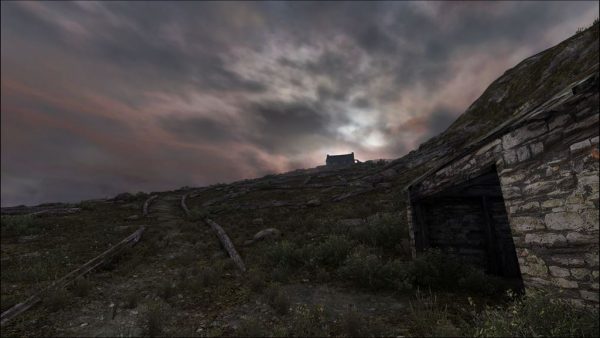Also On: PS4, PC
Publisher: Curve Digital
Developer: The Chinese Room
Medium: Digital
Players: 1
Online: No
ESRB: T
I went into Dear Esther with improbably high expectations. While I’d consciously made an effort to hear as little about the game as possible — as I do with any narrative-focused experience — what little I did know centred around the fact that it was made by The Chinese Room, who were the team responsible for one of my favourite games of all time, Everybody’s Gone To The Rapture (our review here). If that wasn’t reason to be optimistic, I don’t know what would be.
Turns out I should’ve adjusted those expectations to account for the fact that Dear Esther was the game that preceded Everybody’s Gone To the Rapture. Because really, that’s the most salient fact about Dear Esther: while it certainly sets the stage for what The Chinese Room did in their later outing, that’s really all it does. All the stuff that made Everybody’s Gone To The Rapture great in my eyes is only here in embryonic form. The story, the music, the voice acting, the world: Dear Esther operates on a much smaller scale in every respect, causing it to feel more like an impressive demo than a full-on game.
Admittedly, this isn’t a failing on the part of the game so much as it’s a failing on my part to set appropriate expectations. In a vacuum, I don’t think it could be said that Dear Esther is a bad game. The landscapes are appropriately foreboding, befitting a game that?s all about mourning and loss. The voice acting is pretty good, which is important, seeing as there’s only one speaker — voiced by Nigel Carrington — and it’s on him to carry the whole game in that regard. The plot is fine for what it is; one man, alone in isolation, exploring his grief isn’t a topic that gets covered much in video games, so it’s easy to see why the game was so praised on its initial release.
Having said all that, however, it’s plainly obvious how far the so-called ?walking simulator? genre has come in the years since Dear Esther was released. Worlds like those in Everybody’s Gone to the Rapture, Firewatch and Gone Home all feel so much more expansive. Each of them feel as if they take place in a living, breathing world, whereas Dear Esther frequently gives the impression that you’re just moving along a preordained path. You’re never interacting with the world around you here; the most you can do is zoom in on certain objects to get a better look, but even doing that never leads to any greater discoveries or deeper understanding of the world. In fact, all zooming in really does is make plain how flat and unlifelike everything looks up close.
I don’t want to disparage Dear Esther too much, since, ultimately, I did enjoy it. It sets out to tell a small, intimate story, and, considering you can finish the game in well under two hours, it succeeds at doing that with impressive economy. But whereas the games that have come after it all left lasting impressions on me for their ambitions as well as their emotional depths, I have a hard time imagining Dear Esther having that same kind of long-term impact. It’s undeniably good… but if you’re in the mood for great, you’ll need to look at what came after.



